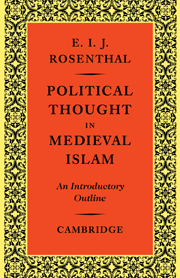Book contents
- Frontmatter
- Contents
- AUTHOR'S NOTE
- ABBREVIATIONS
- INTRODUCTION
- PART I CONSTITUTIONAL LAW AND MUSLIM HISTORY
- I THE QUEST FOR HAPPINESS
- II THE CALIPHATE: THEORY AND FUNCTION
- III GOVERNMENT
- IV THE THEORY OF THE POWER-STATE: IBN KHALDŪN'S STUDY OF CIVILIZATION
- PART II THE PLATONIC LEGACY
- APPENDIX: SOME TURKISH VIEWS ON POLITICS
- NOTES
- GLOSSARY
- INDEX
II - THE CALIPHATE: THEORY AND FUNCTION
Published online by Cambridge University Press: 07 May 2010
- Frontmatter
- Contents
- AUTHOR'S NOTE
- ABBREVIATIONS
- INTRODUCTION
- PART I CONSTITUTIONAL LAW AND MUSLIM HISTORY
- I THE QUEST FOR HAPPINESS
- II THE CALIPHATE: THEORY AND FUNCTION
- III GOVERNMENT
- IV THE THEORY OF THE POWER-STATE: IBN KHALDŪN'S STUDY OF CIVILIZATION
- PART II THE PLATONIC LEGACY
- APPENDIX: SOME TURKISH VIEWS ON POLITICS
- NOTES
- GLOSSARY
- INDEX
Summary
“The science of law is the knowledge of the rights and duties whereby man is enabled to observe right conduct in this life, and to prepare himself for the world to come.” Ḥanafī definition of Fiqh.
Before Muḥammad preached Islam—submission to the will of Allah—the Arabs were organized in tribes, which were divided into clans or families. The desert with its oases does not permit a social and political organization larger than the family, the clan or at most the tribe. To achieve a larger and higher unity, a force is needed which is capable of binding together men of differing customs and traditions. The message of the prophet, gathered in the Qurʾān, provided this cohesion and, with the more material inducements of booty and landed property as the result of the holy war (jihād) on behalf of Allah, succeeded in winning the allegiance to Islam of independent, proud, born warriors. Muḥammad's success was such that under his successors the community of believers was extended far beyond the Arabian peninsula and finally consolidated in the vast Islamic empire in Asia, Africa, Spain and Sicily.
How was it that the message claimed by the messenger of Allah to be God's final revelation to mankind proved acceptable not only to pagans, but also to Christians, Jews and Zoroastrians—all three possessors of a book of revelation, ahl al-kitāb—and to Buddhists?
- Type
- Chapter
- Information
- Political Thought in Medieval IslamAn Introductory Outline, pp. 21 - 61Publisher: Cambridge University PressPrint publication year: 1958



